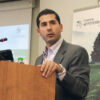In a time of vast technological strides and extreme climate challenges, Greece must adapt in order to ensure and enhance its competitiveness and become more environmentally friendly. One of the country’s much promising sectors that can take us in that direction is undoubtedly agrifood.
In anticipation of the Chamber’s upcoming 11th Agrotechnology Conference, to be held in February 2023 under the title “Agrifood Systems in a Circular Economy Framework: Unblocking the Future,” this issue’s Thought Leaders showcases The American-Hellenic Chamber of Commerce Agrotechnology Committee, inviting top agrotech Thought Leaders to share their thoughts on the sector’s future.

Agriculture Sowing Success
By Athanasios Kouimtzis, CEO of Kouimtzis Group and Chair of AmChamGR’s Agrotechnology Committee
Lately, we keep hearing that Greece is on a steady road to recovery and that the prognosis is very good for our country; however, while shipping and tourism get much of the credit for carrying our country forward, there is another sector that doesn’t get the recognition—and consequently nor the support—it deserves. I am referring, of course, to the agrifood sector.
The primary sector leads exports, and we need to make the most of this.
Agriculture is, unfortunately, a misunderstood sector in Greece. For one, it is not supported as much as it should be at the academic level. There are no real options at the university level for people who want to work professionally in agriculture and the subject isn’t covered in secondary education as a preparatory step for younger students. One exception to this is the American Farm School in Thessaloniki, the only school in the country that provides an education in agriculture. If we want to make studying agriculture a real choice for young people, similar institutions must be established in every prefecture of Greece. Alas, as a state, we have not provided for the basics in terms of education and infrastructure.
For the Greek primary sector to truly excel, we must bet on quality. From those working in the fields to those involved in the financial side of things, everyone working in the sector should be agriculturally literate and have a deep understanding of agriculture. Farmers shouldn’t just rely on practical knowhow; they should also have the appropriate training and be familiar with the relevant methodology. The ultimate goal always being quality.
In Greece, our competitive advantages are many. We have truly unique products, such as Chios mastic and acclaimed regional olive oils, as well as excellent food products, such as the rice produced in Central Macedonia’s paddies. We have to showcase these products. The primary sector leads exports, and we need to make the most of this. For starters, the sector deserves better treatment by the state, which needs to reevaluate the way it deals with the sector’s concerns and challenges. Until this is done, Greek agriculture will remain in the dark. Producers are often called upon to respond to a highly competitive global landscape with insufficient information. We want the state to provide the necessary support and point them in the right direction. The farm-to-shelf model used by winemakers and olive oil manufacturers must be adopted by other producers too. Apart from the obvious advantage for the Greek economy from the increase in exports, the primary sector, if properly strengthened, can be a boon to the country’s rural areas, boosting local economies and leading them to a future of extroversion. Furthermore, investing in agriculture and agrifood can help breathe new life into rural areas, creating many quality jobs and supporting the development of proper infrastructure.
We are currently in a transitional stage from conventional to digital agriculture (precision agriculture), and through this transition, we can cover lost ground and correct many mistakes of the past provided, always, that all parties are aligned and determined to do their very best, implementing good practices and transparency in their transactions. If we succeed, the benefits will be manifold and far-reaching, for the economy and society both.

The Science of Agrifood
By Prof. Anagnostis Argiriou, Senior Scientist, Deputy Director, Institute of Applied Biosciences at the Centre for Research and Technology Hellas (INAB|CERTH)
The primary production sector (agricultural production) and the processing and food sector are pillars of the Greek economy and play an important role in its development, with comparative advantages over other countries. Growing nutritional needs and ongoing social and geopolitical developments require the industry to quickly adapt to modern requirements. Technological developments in agrifood play a crucial role in this process of adapting, and developments in digital, biotechnology and energy in particular determine the sustainability and competitiveness of the agrifood sector.
Developments in digital, biotechnology and energy determine the sustainability and competitiveness of the agrifood sector
The Agrotechnology Committee of the American-Hellenic Chamber of Commerce monitors, highlights and promotes, through the scientific and business expertise of its members and the entities each of them represents, those technological developments that can improve the performance of the agrifood sector. In particular, the Institute of Applied Biosciences at the Centre for Research and Technology Hellas (INAB|CERTH) actively works to upgrade research in the field of agrobiotechnology, contributing decisively to
- the mapping, utilization and promotion of Greek biodiversity,
- the design and development of improved varieties and new functional foods with special nutritional characteristics,
- the development of digital and molecular methodologies for the traceability of agrifood products at all stages of the production chain,
- the utilization of various microorganisms and plants for the production of high-value compounds in an environmentally friendly manner, and
- the development of innovative pilot applications in the aquaculture sector in combination with the utilization of marine biodiversity in our country.

Greece Needs to Bring Its Rural Communities Back to Life
By Demetri Chriss, Director, Business Development, Macedonian Thrace Brewery SA
New age farming techniques and the latest advances in agrotech can only take us so far. If Greece stands any chance of successfully navigating the shoals of climate change and the global food crisis, our rural communities need to be brought back to life and, ultimately, attract a new generation of agro-entrepreneurs. The transition to high added value crops and hi-tech solutions to age old problems have made the prospect of running a successful agro-business in Greece more appealing than ever. However, in order to have any chance of attaining the critical mass of new farming families that are necessary to address and eventually reverse the decades of depopulation that have rendered large swathes of rural Greece lifeless, a comprehensive package of incentives and benefits will have to be offered to young agro-entrepreneurs that are willing to serve as stewards of the land.
Incentives and benefits will have to be offered to young agro-entrepreneurs that are willing to serve as stewards of the land
Incentives for those that choose to establish residency in Greece’s border communities where depopulation has already reached dramatic proportions and poses a threat to its national security must be especially generous. Ideally, these should cover the full period required to create and raise a family, i.e. 20 years, provided that the agro-entrepreneurs maintain their business and residency in situ. Alongside a generous package of tax incentives, subsidies and other benefits for new households, the central government must also guarantee access to essential healthcare and schooling for these modern day akrites—and their children, until they complete their compulsory education—by utilizing the latest technological advances and fast-tracking the legislation that would be necessary to make this a reality.

Staying Close to Our Roots
By Evangelos Gerovassiliou, Agronomist-Oenologist
Producing high-quality wines requires knowhow, creativity, authenticity, and a lot of patience—but it also requires sharing a common vision with your team. Throughout the different stages, it is essential always to remember your roots.

Sustaining Growth
By Nikos Ch. Karagiorgos, N. Karagiorgos Bros S.A., President and CEO
The Cotton farming in Greece, and the cotton sector in general, has a long tradition and very solid foundations. Redding businesses offer producers the supplies and means to preserve their crops and secure the best prices in a highly fluctuating global market.

Time for Change
By Dr. Georgios E. Katsaros, Managing Director, E. Katsaros SA
2022 has been a challenging year for Greek farmers. Although broadly, open field crops have performed well both in terms of quantities and pricing, the situation has not been pleasant for fruit farmers. Fruit prices have remained low while cultivation costs have increased significantly, with labor shortages and the high cost of diesel and electricity creating serious challenges and uncertainty for the future. Meanwhile, the government has not addressed allegations of price fixing in the primary fruit market. Unless the situation is improved in 2023, we will experience a significant number of fruit farmers exiting the field.
There is a need for a new operating model that will enable farmers to survive and remain profitable
The tractor market has also seen significant weakness in demand that, in light of the current price increases throughout the industry, will likely continue, as a result of further decreases in both purchasing power and demand from farmers. Relevant subsidies have not as yet been announced and implementation of measures is slow and demanding. The labor shortage must be addressed as a matter of urgency in 2023, while the necessary regulations must be implemented to ensure minimum prices of fruits in the primary market. The new common agricultural policy implemented in Europe will steadily modify how EU subsidies are distributed to farmers, and in many cases, net inflows will decrease. This combined with the effects of climate change makes it clear that there is a need for a new operating model that will enable farmers to survive and remain profitable.

Making Farming a Career of Choice for the Younger Generation
By Effie Lazaridou, Chief Executive Officer, New Agriculture, New Generation
The agrifood sector plays a critical role in the global effort to save the planet, feed a growing population, and secure the survival of rural communities, with food security, safety and supply chain issues leading public dialogue. In the last 50 years, global fertilizer consumption quadrupled, irrigated land doubled, and pesticide consumption increased 38 times, while growth in agricultural yield has not kept pace with food production, and soil degradation extended to 35%. Food systems are being redefined under the principles of circular economy, regenerative practices, and agroecology. Tectonic changes are underway regarding both production and consumption, and a successful transition calls for knowledge, technology, and the involvement of the younger generation.
We need educated, knowledgeable and tech-savvy young farmers
The EU’s Farm to Fork strategy aims for fair, healthy and environmentally-friendly food systems, focusing on quality and sufficiency and leveraging information, awareness and education initiatives. In the launch of this international effort, Greece’s position is weak: Only 2.9% of young farmers, under 35 years of age, received full agricultural training compared to 21,7% in the EU. It is a national priority to make farming a career of choice for younger generations. We need educated, knowledgeable and tech-savvy young farmers with an entrepreneurial spirit and synergistic mentality. The redesign of the national vocational education and training (VET) model in the agrifood sector is critical and must include further development of VET institutions, high quality training, knowledge transfer from research to production, and further private sector engagement. The national Agricultural Knowledge and Innovation System, currently under design, must ensure two-way communication among stakeholders, technical problemsolving, and competitiveness for agricultural businesses.
Initiatives led by New Agriculture New Generation are complementing the national effort with state-of-the-art, large-scale, high-impact activities for workforce development. There are no resources to spare from this essential campaign for developing Greece’s farmers of the future.
New Agriculture New Generation is a non-profit organization that creates employment and entrepreneurship opportunities for young people in the Greek agrifood sector, empowering the country’s youth and supporting the sector’s revitalization. It was established with the support of the Stavros Niarchos Foundation (SNF) as part of the SNF’s Recharging the Youth longterm grant initiative.

Training Farmers Is the Key to Agriculture 5.0
By Olga Mitsiolidou, Managing Director / Spare Parts Manager, Agrotech SA
Today, the constant crises and the war in Ukraine, one of the largest crop producing regions in the world, have led to a decrease in global food production. These shortages have caused production costs and product prices to rise with a negative impact on the end consumer. However, besides the shortages, escalating energy costs and inflation, our planet faces one of the biggest challenges of our times: climate change. In this context, precision agriculture—and its methods, which enhance environmental protection, reduce production costs and improve the quality and quantity of the crop—is the only way.
Precision agriculture is the only way
By using automated guidance and section control systems, farmers can reduce the quantity of fertilizer applied, save fuels and minimize gaps or overlaps. Pesticides can be used safely and correctly only in the limited areas where they are needed and in the required quantity. Sprayers with See & Spray technology detect weeds, identify their species and apply targeted spraying. Artificial intelligence and machine learning encompassed in autonomous farm tractors. Tools and implements that do not require an operator or a user, thus reducing operating costs and potential errors. Agricultural drones that do not damage the soil and do not consume any fuel.
Tools, technologies and applications of the Agriculture 5.0 era we are living in, all using core components such as AI, IoT & machine learning, are in our hands. In this context, it is imperative that Greek farmers receive targeted education and training to become familiar with the use of all these technological innovations, enabling them to make use of not only a few but all available opportunities and possibilities.

The Many F’s of Agriculture
By Athanasios Tsaftaris, Emeritus Professor, Aristotle University of Thessaloniki
It is now more than obvious that our society is facing major challenges such as the effects of climate change and the explosion of the global population with the subsequent large increase in demand for food production. We use agriculture not only for food but also for animal feed, fuel, fibers, flowers, f(ph)armaceuticals… So many Fs that must be care of… How many products do we expect agriculture to produce for us? We are talking about tripling food production in the next two decades, while we are at the same time dealing with shrinking resources, repurposing land and wasting water at the expense of agriculture. Our sole great hope lies in scientific progress. Only through science will we be able to secure a sustainable future.
Only through science will we be able to secure a sustainable future

The Role of Agricultural Extension in Food Security and Agrifood Sustainability
By Dr. Evangelos Vergos, Director of the Center of Lifelong Learning and Agricultural Extension, Perrotis College
The primary agricultural production sector faces continuous challenges due to its nature. Inevitably, the gradual climate change in effect leads to environmental instability and malfunction, and it stands to be the major obstacle to sustainable sectorial progress and rural development. It is further amplified via seamless population growth, migration, new consumer food preferences, and structural policy limitations that produce geopolitical, social, and economic issues at the expense of primary food security. To that effect, the promotion and application of contemporary technological cognitive functions for food production and environmental sustainability is becoming more demanding and of great importance in resource exploitation, and agricultural extension applications need to change focus, structure and approach in order to effectively respond to rapidly changing contexts. Attitudes and new directions to agricultural sustainability rules are well known. Today, farmers not only need to be good managers with up-to-date knowledge and skills but they must also possess good leadership attributes, while extensionists must possess the qualities of dedicated missionaries.
Agricultural extension applications need to change focus, structure and approach in order to effectively respond to rapidly changing contexts
Undoubtedly then, agricultural extension becomes multidimensional in terms of functional ability, with new tasks increasingly assumed by the agrifood industry and educational institutions. It is considered a genuine tool for mitigating the evolutionary velocity of the aforementioned irregular issues in effect with synergies between the public and private sectors, considering the present and future demands of society, and merging training, knowledge development, and skill-enhancement methodologies with the goal to educate agrifood chain stakeholders, optimize productivity, and improve rural livelihoods by promoting sustainability.

Time to Invest in Modern Agrifood Production Systems
By Antonis Vezyroglou, Founder and CEO, Vezyroglou Farm
A great deal of issues have recently been threatening what is probably the most vital resource in the world: food. We are experiencing major shifts and trends affecting food supply—such as population growth, shifting consumer needs, and climate change—and we are also experiencing frequent short-term shocks that are causing shortages and hiking up food prices on top of that. Our challenge is to build agrifood systems that are more resilient to external shocks and also able to tackle longterm trends at the same time and in a sustainable manner.
Innovative alternative food production systems will revolutionize the way we produce and define food
Firstly, we need to modernize and improve the current production systems. The EU has shown the way by setting certain targets via the Green Deal. Measures to reduce inputs to agriculture, enhance the circular economy, reduce carbon emissions and reduce food waste are undoubtedly steps in the right direction. At the same time, we need to speed up research in innovative alternative food production systems that will revolutionize the way we produce and define food. Alternative protein production, algae and microbe utilization, novel farming systems and agro-biotechnology are some of the most promising technologies that will allow us to produce food more sustainably.
The agrifood system today is more interconnected than ever. Over the past decades, globalization has linked supply chains around the globe, while at the same time, consumer trends such as eating healthier and safer food have forced the primary and secondary sectors to come close. We have invested a lot in industry 4.0 technologies, but probably not enough in our food supply and security. Now is the time for investors, entrepreneurs, multinational companies and nations around the globe to work together to ensure sustainable and more robust food production.






